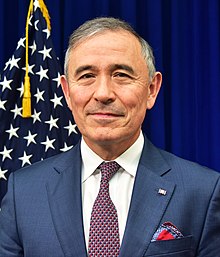Harry Binkley Harris Jr. (born August 4, 1956) is a retired Japanese-born American diplomat and retired U.S. Navy officer. He was the first American of Japanese descent to lead US Pacific Command and was the highest-ranking American of Japanese descent in U.S. Navy history during his time as commander.
Born in Japan, he is also the first 4-star admiral to have participated in the Navy Junior Reserve Officers' Training Corps (NJROTC) and the first officer from the U.S. Navy's P-3 Orion maritime patrol aviation community to achieve 4-star rank. While a vice admiral, he served as the Assistant to the Chairman of the Joint Chiefs of Staff. Harris was Commander, U.S. Pacific Fleet in Hawaii from 2013 to 2015. He took command of USPACOM on May 27, 2015, and retired from Naval service on June 1, 2018.
Harris is a 1978 graduate of the United States Naval Academy at Annapolis. He was the U.S. Navy's "Old Goat" – the longest-serving Naval Academy graduate still on active duty – from January 2017 until April 2018, when he passed the title on to his classmate, Admiral Kurt W. Tidd, in a private ceremony at the Pentagon. He was also the Navy's 15th "Gray Owl" – the Naval Flight Officer on active duty who has held this designation the longest period. Harris passed the Gray Owl to Vice Admiral Herman A. Shelanski at the National Naval Aviation Museum's 2018 Naval Aviation Symposium. Governor Rick Perry designated him as an admiral in the Texas Navy on July 18, 2006. He was also designated as a "Colonel Aide de Camp" for the state of Tennessee by Governor Phil Bredesen on August 8, 2007 and a "Kentucky Colonel" by Kentucky Governor Andy Beshear on March 3, 2021.
Early life and education
He was born in Yokosuka, Kanagawa, in 1956. His mother, Fumiko (Ohno), was Japanese and his father, LTJG Harry Binkley Harris, was a U.S. Navy machinist's mate (and later chief petty officer) when he served aboard the USS Lexington (CV-2) during the Battle of the Coral Sea. After his family's move to the United States, Harris grew up in Crossville, Tennessee, and Pensacola, Florida, where he attended local public schools.
Career
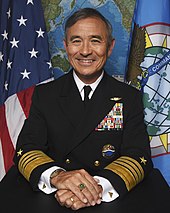
Harris graduated from the U.S. Naval Academy in 1978. He majored in general engineering and was a varsity fencer.
After flight training, he was designated as a Naval Flight Officer and assigned to Patrol Squadron Forty-Four (VP-44), homeported at Naval Air Station Brunswick, Maine. He flew the P-3C Orion, deploying throughout the Pacific, Indian and Atlantic Oceans, and Mediterranean Sea. His subsequent operational tours include assignment as a tactical action officer on board USS Saratoga, to include participation in dealing with the Achille Lauro hijacking and the 1986 air strikes against Libya (Operation Attain Document III). He served as Operations Officer in Patrol Squadron Four (VP-4) at Naval Air Station Barbers Point, Hawaii, deploying to Southwest Asia during Operations Desert Shield/Desert Storm. He had three tours with Patrol and Reconnaissance Wing 1/Task Force 57/Task Force 72, homeported in Kami Seya, Japan. During his earlier tours with Patrol and Reconnaissance Wing 1, Harris participated in Operations Earnest Will and Southern Watch. In 1999–2000, he attended MIT Seminar XXI.
In 2002, he reported to Commander, U.S. Naval Forces Central Command / U.S. Fifth Fleet in Manama, Bahrain, serving as Assistant Chief of Staff for Operations, Plans, and Pol-Mil Affairs (N3/N5). He was responsible for the planning and execution of the Naval component's portion of Operation Iraqi Freedom, which began on March 19, 2003.
His aviation command assignments include Patrol Squadron Forty-Six (VP-46) at Naval Air Station Whidbey Island, Washington, and Patrol and Reconnaissance Wing 1/CTF 57/CTF 72 at Kami Seya, Japan. Task Force 57, the U.S. 5th Fleet maritime patrol and reconnaissance aircraft force, was heavily involved in Operation Enduring Freedom as squadrons and aircrews under his command flew nearly 1,000 P-3 and EP-3 surveillance and reconnaissance sorties over Afghanistan. Additional Flag Officer command assignments included Joint Task Force Guantanamo in Cuba, U.S. Sixth Fleet / Naval Striking and Support Forces NATO in Italy, and the U.S. Pacific Fleet.
Harris' shore assignments include Aide and Flag Lieutenant to the Commander, U.S. Naval Forces Japan in Yokosuka, Japan; three tours on the staff of the Chief of Naval Operations to include two flag officer tours and a tour as a strategist in the Strategy and Concepts Branch; Chief Speechwriter to the Chairman of the Joint Chiefs of Staff; and Assistant to the Chairman of the Joint Chiefs of Staff. His Flag assignments are described below.
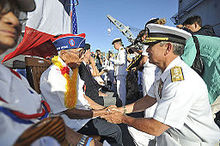

His educational assignments include selection for the Navy's Harvard/Tufts Program, where he graduated with a Master's of Public Administration from Harvard's John F. Kennedy School of Government in 1992. Subsequently, selected as an Arthur S. Moreau Scholar, he studied international relations and ethics of war at Oxford and Georgetown University, earning a Master of Arts in National Security Studies from the latter in 1994. While at Georgetown, he was a Fellow in the School of Foreign Service. He was also an MIT Seminar 21 fellow for the 1999–2000 class.
Harris has logged 4400 flight hours – including over 400 combat hours – in U.S. and foreign maritime patrol and reconnaissance aircraft. He is a recipient of the Navy League's Stephen Decatur Award for Operational Competence, the CIA's Agency Seal Medal, and the CIA's Ambassador Award in 2021. For his work in diversity and leadership, he has also received the NECO Ellis Island Medal of Honor, the APAICS Lifetime Achievement Award, the WWAAC Community Spirit Award, and the AAGEN Distinguished Lifetime Achievement Award. In 2017, Harris was named an Honorary Chief Petty Officer by Master Chief Petty Officer of the Navy Steven S. Giordano in recognition of his leadership and "extraordinary dedication to the Navy's core values of honor, courage, and commitment." In 2021, the Institute for Corean-American Studies (ICAS) named him an ICAS Distinguished Fellow; he was recognized by Tufts University with its Dr. Jean Mayer Global Citizenship Award; he was inducted into the Maritime Patrol Association Hall of Honor; and he received the Naval order of the U.S. Distinguished Sea Service Award. The Honolulu Council of the Navy League of the U.S. awarded him its American Patriot Award for 2022. He is a member of the Council on Foreign Relations and the Council of American Ambassadors.
Director, Current Operations and Anti-Terrorism/Force Protection Division (OPNAV N31/34)
In August 2004, in his first Flag assignment, he reported to the staff of the Chief of Naval Operations, where he was responsible for Navy current operations, the Navy Command Center, and anti-terrorism/force protection policy.
Commander, Joint Task Force Guantanamo
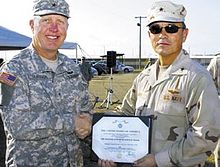
In March 2006, he assumed command of Joint Task Force Guantanamo in Cuba. His service was notable as he was in charge when three prisoners, Mani Shaman Turki al-Habardi Al-Utaybi, Salah Ali Abdullah Ahmed al-Salami and Yasser Talal Al Zahrani, died in the custody of US forces. Defense reported the deaths as suicides. Harris said at the time,
I believe this was not an act of desperation, but an act of asymmetrical warfare waged against us.
Harris ordered a full investigation by the Naval Criminal Investigative Service (NCIS), which published its report in a heavily redacted version in August 2008.
Main article: Guantanamo Bay homicide accusations Main article: Guantanamo Bay detention camp suicide attemptsA report, Death in Camp Delta, was published in December 2009 by the Center for Policy & Research of Seton Hall University School of Law, under the supervision of its director, Professor Mark Denbeaux, attorney for two Guantanamo detainees, criticizing numerous inconsistencies in the official accounts of these deaths. The report suggested there had either been gross negligence or an attempt to cover up homicides of the men, perhaps due to torture under interrogation.
On January 18, 2010, Scott Horton of Harper's Magazine published a story suggesting that al-Salami, Al-Utaybi and Al-Zahrani had died as a result of accidental manslaughter during a torture session, and that the official account was a cover-up. Horton had undertaken a joint investigation with NBC News, based on an account by four former guards at Guantanamo Bay detention camp. They suggested that the men had died at a black site, informally called "Camp No," used for interrogation including torture. It was located about a mile outside the regular camp boundaries.
Director of Operations, U.S. Southern Command
From June 2007 to April 2008, Harris served as director of operations (J3) for U.S. Southern Command in Miami. He led the joint planning effort for Operation Willing Spirit (the rescue of American hostages held hostage in Colombia).
Deputy Chief of Naval Operations (OPNAV N6)
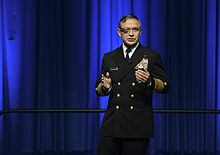
Harris returned to the Pentagon to serve as the Deputy Chief of Naval Operations for Communication Networks (OPNAV N6) and the Deputy Department of the Navy Chief Information Officer (Navy) until November 2009. He was responsible for early resource sponsor decisions for the Consolidated Afloat Networks and Enterprise Services (CANES), Next Generation Enterprise Network (NGEN), Mobile User Objective System (MUOS) and Maritime Domain Awareness (MDA).
Commander, U.S. Sixth Fleet
In November 2009, Harris assumed command of the U.S. 6th Fleet and the Striking and Support Forces NATO, both headquartered in Naples, Italy. He concurrently served as deputy commander, U.S. Naval Forces Europe and deputy commander, U.S. Naval Forces Africa. In 2011, he was designated as the Joint Force Maritime Component Commander (JFMCC) for Operation Odyssey Dawn, the U.S.-led coalition operation against Libya.
Assistant to the Chairman of the Joint Chiefs of Staff
In October 2011, he assumed the position of Assistant to the Chairman of the Joint Chiefs of Staff. In this capacity, he served as the Chairman's direct representative to the U.S. Secretary of State. He was also the designated U.S. Roadmap Monitor for the Middle East Peace Process.
Commander, U.S. Pacific Fleet

Harris was promoted to admiral and assumed command of the US Pacific Fleet on October 16, 2013. He has been critical Archived 2016-05-29 at the Wayback Machine of Chinese land reclamation activities in the South China Sea saying "(China is) creating a great wall of sand".
Commander, U.S. Pacific Command
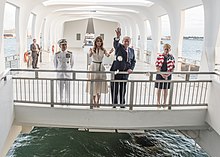
Harris was nominated on September 22, 2014, by President Barack Obama to command the US Pacific Command. His appointment was confirmed by the Senate on December 11, 2014. Harris took command of USPACOM on May 27, 2015. He regarded North Korea as the biggest threat to security in Asia, calling for diplomacy backed by military power to "bring Kim Jong-Un to his senses; not to his knees" in pursuit of peaceful denuclearization of the Korean Peninsula.
In December 2016, Harris led the military commemoration activities for the 75th anniversary of the attacks on Pearl Harbor and Oahu. On 5 December, he paid tribute to Japanese-Americans who served in World War II. He delivered the keynote speech during National Pearl Harbor Remembrance Day, 7 December, and accompanied President Barack Obama and Japanese Prime Minister Shinzō Abe to render honors at the USS Arizona Memorial on 27 December. The visit – the first by a Japanese Prime Minister to the Memorial – was hailed by President Obama as "a historic gesture of reconciliation." He called for the resurgence of the Quad -- the informal grouping of like-minded democracies of the U.S., Japan, Australian, and India -- at the inaugural Raisina Dialogue in New Delhi in 2016. In 2017, he began publicly advocating for the renegotiation of, and potential withdrawal from, "unilaterally self-limiting treaties," including the Intermediate-Range Nuclear Force (INF) Treaty.
U.S. Ambassador to South Korea

Harris was nominated by President Donald Trump to serve as U.S. Ambassador to Australia in February 2018, but was renominated to become Ambassador to South Korea by Trump at the suggestion of newly sworn-in Secretary of State Mike Pompeo on May 23, 2018.
Harris was confirmed by the U.S. Senate to serve as Ambassador to South Korea by voice vote on June 28, 2018. On June 29, 2018, Harris was officially sworn in as the new United States Ambassador to South Korea.
One of the major issues Harris had to take forward was increasing South Korea's share of the costs for joint security responsibilities, which President Trump wished to see increased from $830 million to about $5 billion annually.
In April 2020, Harris was reportedly planning on stepping down as ambassador in the coming months. In late April 2020, Harris tweeted a congratulatory message to the Republic of Korea (ROK) on its delivery of a Global Hawk UAV that the country purchased from the United States through U.S. Foreign Military Sales (FMS), which is managed and supervised by the Department of State. The tweet received criticism from the Korean press citing ROKG authorities’ comments that it was an inappropriate disclosure, despite the purchase and delivery of the Global Hawk program having been part of the public record in both the United States and Republic of Korea since originally approved in 2012, and the fact that his tweet was previewed with the ROK Ministry of Defense.
He stepped down as ambassador in January 2021. In an interview with the Financial Times published on 5 February 2021, He said "Some of the race baiting, I was surprised by that" because of his part-Japanese background.
He was awarded South Korea's Order of Diplomatic Service Merit (Gwanghwa Medal) at a ceremony in Washington, D.C. on September 8, 2021.
Controversy

Some South Korean activists criticized Harris over his mustache, which they claimed was reminiscent of Japanese-appointed Governors-General (Itō Hirobumi) during Japanese rule over Korea. Harris disagreed with the criticisms and suggested they stemmed from his Japanese heritage. Harris shaved off his mustache in July 2020. A CNN article written by Joshua Berlinger suggested that given Harris's ancestry, the criticism of his mustache may be due to racism.
Some South Korean liberal media outlets said the controversy over his mustache was triggered by his previous remarks that ignored South Korea's sovereignty and showed similar political views to the right-wing of Japan. Harris referred to politicians around Moon Jae-in as "Jongbuk" (종북), and was later accused of acting like "Japanese colonial government" (일본 총독) by South Korean liberals. In South Korea, the term "Jongbuk" is mainly recognized as an extreme right-wing rhetoric that ultra-conservatives use to criticize liberals and progressives. South Korean liberals and progressives generally support the Sunshine Policy, are skeptical of sanctions against North Korea, and are critical of Japan.
Awards and decorations

| ||
- Harris also received the CIA Agency Seal Medal
 as well as a foreign badge.
as well as a foreign badge.
Foreign orders, decorations and medals
 Order of National Security Merit, Tong-il (1st Class) Medal (South Korea), awarded 3 November 2014 by ROK Chief of Naval Operations Adm. Hwang Ki-chul, on behalf of President Park Geun-hye, for "distinguished service and meritorious contributions to the security of the Republic of Korea" while serving as Commander, U.S. Pacific Fleet.
Order of National Security Merit, Tong-il (1st Class) Medal (South Korea), awarded 3 November 2014 by ROK Chief of Naval Operations Adm. Hwang Ki-chul, on behalf of President Park Geun-hye, for "distinguished service and meritorious contributions to the security of the Republic of Korea" while serving as Commander, U.S. Pacific Fleet. Meritorious Military Service Medal (Singapore), awarded 17 October 2017 by Minister for Defence Dr. Ng Eng Hen, for “significant contributions toward enhancing the longstanding and excellent defence relations between the United States and Singapore” as Commander, U.S. Pacific Command.
Meritorious Military Service Medal (Singapore), awarded 17 October 2017 by Minister for Defence Dr. Ng Eng Hen, for “significant contributions toward enhancing the longstanding and excellent defence relations between the United States and Singapore” as Commander, U.S. Pacific Command. Officier (Officer) of the Legion of Honour (France), awarded 11 April 2018, by Ambassador Gérard Araud.
Officier (Officer) of the Legion of Honour (France), awarded 11 April 2018, by Ambassador Gérard Araud. Grand Cordon of the Order of the Rising Sun (Japan), awarded 26 April 2018, by Minister of Defense Itsunori Onodera on behalf of Emperor of Japan.
Grand Cordon of the Order of the Rising Sun (Japan), awarded 26 April 2018, by Minister of Defense Itsunori Onodera on behalf of Emperor of Japan. Komandante (Commander) of the Legion of Honor (Philippines), awarded 27 April 2018 by Executive Secretary Salvador Medialdea on behalf of President Rodrigo Duterte.
Komandante (Commander) of the Legion of Honor (Philippines), awarded 27 April 2018 by Executive Secretary Salvador Medialdea on behalf of President Rodrigo Duterte. Medal for International Military Cooperation (Mongolia), awarded 27 April 2018 by Lieutenant General Dulamsürengiin Davaa, Chief of General Staff of the Mongolian Armed Forces, on behalf of Minister of Defense Nyamaagiin Enkhbold.
Medal for International Military Cooperation (Mongolia), awarded 27 April 2018 by Lieutenant General Dulamsürengiin Davaa, Chief of General Staff of the Mongolian Armed Forces, on behalf of Minister of Defense Nyamaagiin Enkhbold. Honorary Officer (AO) of the Order of Australia, awarded 29 May 2018 by Governor General of Australia General Sir Peter Cosgrove as part of the 2018 Special honours list, for “distinguished service to the military relationship between Australia and the United States through leadership, passion, and strategic foresight.”
Honorary Officer (AO) of the Order of Australia, awarded 29 May 2018 by Governor General of Australia General Sir Peter Cosgrove as part of the 2018 Special honours list, for “distinguished service to the military relationship between Australia and the United States through leadership, passion, and strategic foresight.”
Personal life
Harris is married to Brunhilde Kempf "Bruni" Bradley. Bruni Bradley is a 1984 Naval Academy graduate and former Navy commander who retired after 25 years of service and now is a member of the board of directors for the Military Child Education Coalition.
References
- "Newsletter". 1978.
- "NOMINATIONS BEFORE THE SENATE ARMED SERVICES COMMITTEE, SEC- OND SESSION, 113TH CONGRESS" (PDF). Congress.gov. 2 December 2014. Archived from the original (PDF) on 6 October 2015.
- ^ "Command Biography". U.S. Pacific Command. Archived from the original on 16 June 2016. Retrieved 1 February 2017.
- ^ Steele, Jeanette (July 12, 2014). "In Pacific, 1st Asian-American fleet leader". San Diego Union-Tribune. Retrieved June 1, 2015.
- Spitzer, Kirk (25 May 2015). "The New Head of the U.S. Pacific Command Talks to TIME About the Pivot to Asia and His Asian Roots". Time. Time. Retrieved 14 March 2024.
- "Ambassador Harry Harris". NDIA. Retrieved 14 March 2024.
- Miller, Michael F. (19 April 2017). "From Four Bars to Four Stars: First NJROTC Cadet to Reach Full Admiral Speaks to Navy's Newest Sailors". U.S. Navy. Naval Service Training Command Public Affairs. Retrieved 24 June 2017.
- "U.S. Navy Official Web Site". U.S. Department of the Navy.
- McAvoy, Audrey (October 16, 2013). "New commander takes over U.S. Pacific Fleet". Honolulu Star Advertiser. Archived from the original on December 22, 2014. Retrieved October 17, 2013.
- Carter, Ash. "U.S. Pacific Command Change of Command". U.S. Department of Defense. Retrieved 5 January 2016.
- Garamone, Jim (April 11, 2018). "Pacom's Harris Passes 'Old Goat' Award to Southcom's Tidd". U.S. Department of Defense. DOD News. Retrieved 19 May 2018.
- "Museum Foundation to Host Naval Aviation Symposium". 25 April 2018. Retrieved 19 May 2018.
- "Texas Navy" (PDF).
- Marquis Who's Who
- Spitzer, Kirk (May 25, 2015). "The New Head of the U.S. Pacific Command Talks to TIME About the Pivot to Asia and His Asian Roots". TIME. Retrieved June 1, 2015.
- "Billionaire explorer discovers sunken US WWII aircraft carrier | CNN Politics". CNN. 2018-03-05. Archived from the original on 2023-04-05.
- "Official biography: Harry Harris". US Department of Defense.
- Action in the Gulf of Sidra (1986)
- Art, Robert (September 1, 2015). "From the Director: September, 2015". MIT Seminar XXI. Massachusetts Institute of Technology.; Massachusetts Institute of Technology. "Find Alumni". MIT Seminar XXI. Massachusetts Institute of Technology.
- "PACOM Recognizes Vital Leadership During Navy Chief Pinning Ceremony; Harris Made Honorary Chief Petty Officer". U.S. Pacific Command. 19 September 2017. Retrieved 3 October 2017.
- "ADM Harry B. Harris, Jr., USN (Ret) - 2021 Distinguished Sea Service Awardee". Naval Order of the United States. 30 October 2021. Retrieved 14 March 2024.
- "Council on Foreign Relations". Council on Foreign Relations. Retrieved 2019-03-14.
- ^ "The Guantánamo "Suicides": A Camp Delta sergeant blows the whistle". Harper's Magazine. 18 January 2010.
- "Seton Hall Law releases latest GTMO report, Death in Camp Delta". Archived from the original on 2013-11-15. Retrieved 2010-01-21.
- "Death in Camp Delta" (PDF). Archived from the original (PDF) on 2016-04-12. Retrieved 2010-01-21.
- Mark P. Denbeaux Faculty Profile, Seton Hall University School of Law
- "Archived copy". Archived from the original on 2013-10-05. Retrieved 2013-10-03.
{{cite web}}: CS1 maint: archived copy as title (link) - McAvoy, Audrey (October 16, 2013). "New commander takes over U.S. Pacific Fleet". San Francisco Chronicle. Retrieved October 24, 2013.
- McGuirk, Rod (March 31, 2015). "US admiral says China 'creating a great wall of sand' in sea". Associated Press. Retrieved June 1, 2015.
- Kakesako, Gregg (22 September 2014). "Harris nominated to be Pacific commander". Honolulu Star-Advertiser. Retrieved 24 September 2014.
- "Flag Officer Announcement". Department of Defense News Release. 22 September 2014. Retrieved 24 September 2014.
- "Adm. Harris confirmed for Pacific Command". Rafu Shimpo. 22 December 2014. Retrieved 22 December 2014.
- "PN2085—Adm. Harry B. Harris Jr". Congress.gov. 11 December 2014. Retrieved 11 December 2014.
- Tweed, David (9 December 2014). "China Takes Nuclear Weapons Underwater Where Prying Eyes Can't See". bloomberg.com. Retrieved 9 December 2014.
- "U.S. commander on Kim Jong Un: 'Bring him to his senses, not to his knees'". Washington Post. 26 April 2017. Retrieved 13 December 2017.
- "U.S. Pacific Commander: Military-backed diplomacy needed to deal with North Korea". Reuters. 15 November 2017. Retrieved 13 December 2017.
- Adm. Harry B. Harris, Jr. "Americans of Japanese Ancestry (AJA) Nisei Veteran Tribute". U.S. Pacific Command. Retrieved 1 February 2017.
- Adm. Harry B. Harris, Jr. "National Pearl Harbor Remembrance Day Commemoration". U.S. Pacific Command. Retrieved 1 February 2017.
- "Obama, Abe remember Pearl Harbor dead in historic Arizona Memorial visit". Honolulu Star-Advertiser. 27 December 2016. Retrieved 1 February 2017.
- Harris, Harry. "Raisina Dialogue Remarks - "Let's Be Ambitious Together"". U.S. Indo-Pacific Command. Retrieved 14 March 2024.
- Mcleary, Paul (14 February 2018). "PACOM Harris: U.S. Needs to Develop Hypersonic Weapons, Criticizes 'Self-Limiting' Missile Treaties". USNI News. Retrieved 14 March 2024.
- Eckstein, Megan (27 April 2017). "PACOM: U.S. Should Renegotiate INF Missile Treaty to Better Compete with China". USNI News. Retrieved 14 March 2024.
- Harris, Harry. "STATEMENT OF ADMIRAL HARRY B. HARRIS JR., U.S. NAVY COMMANDER, U.S. PACIFIC COMMAND BEFORE THE HOUSE ARMED SERVICES COMMITTEE ON U.S. PACIFIC COMMAND POSTURE 26 APRIL 2017" (PDF). House Armed Services Committee. Retrieved 14 March 2024.
- Panda, Ankit. "DOWNLOAD PDF The End of the INF Treaty and New U.S. Missiles". Carnegie Endowment for International Peace. Retrieved 14 March 2024.
- Lahiri, Tripti. "The US's new South Korea ambassador wants Kim Jong Un "to come to his senses and not his knees"". Quartz. Retrieved July 1, 2018.
- Rogin, Josh. "Pompeo planning to switch Australia ambassador nominee to South Korea". The Washington Post. Retrieved July 1, 2018.
- United States Senate (28 June 2018). "PN2024 — Harry B. Harris Jr. — Department of State". Retrieved July 1, 2018.
- United States Department of State
- Bosco, Joseph (24 January 2020). "South Korea and the billion mustache". The Hill. Washington DC. Retrieved 21 April 2020.
- Shin, Hyonhee (April 8, 2020). "Exclusive: U.S. ambassador to South Korea is discussing plans to resign - sources". Reuters. Retrieved April 11, 2020.
- Seok-min, Oh (20 April 2020). "U.S. ambassador's tweet on Global Hawk sparks controversy over publicity of sensitive military assets". Yonhap News Agency. Retrieved 21 April 2020.
- Ji-won, Noh (21 April 2020). "Harry Harris posts photo of strategic asset acquired by S. Korean military despite Seoul's objections". The Hankyoreh. Retrieved 21 April 2020.
- ^ "Republic of Korea – RQ-4 Block 30 (I) Global Hawk Remotely Piloted Aircraft". Defense Security Cooperation Agency. Retrieved 19 October 2020.
- "State Dept. approves $950M drone support services sale to South Korea". UPI.com. United Press International, Inc. United Press International, Inc. 30 July 2019. Retrieved 19 October 2020.
- "2021-25 MTDP". Ministry of National Defense. Retrieved 19 October 2020.
- "2020-24 MTDP". Ministry of National Defense. Retrieved 19 October 2020.
- "2019-23 MTDP". Ministry of National Defense. Retrieved 19 October 2020.
- "2014 Defense White Paper" (PDF). Ministry of National Defense. Minister of National Defense. Retrieved 19 October 2020.
- "2018 Defense White Paper" (PDF). Ministry of National Defense. Retrieved 19 October 2020.
- 확고한 군사대비태세 유지, 북 미사일·영공 침범 단호 대처 (in Korean). Republic of Korea Ministry of Defense. Kookbang Ilbo. 10 October 2019. Retrieved 19 October 2020.
- "South Korea's first Global Hawk spy plane arrives". The Korea Times. Korea Times. 23 December 2019. Retrieved 19 October 2020.
- 軍, 한반도 밖까지 볼수 있다…글로벌호크 오늘 새벽에 1대 도착. Yonhap News Agency (in Korean). 23 December 2019. Retrieved 19 October 2020.
- "The US ambassador in Seoul on Trump, diplomacy and setting up that summit with Kim Jong Un". The Financial Times. February 5, 2021. Archived from the original on 2022-12-11. Retrieved 2021-02-17.
- "Ex-U.S. envoy receives S. Korean medal". Yonhap News Agency. Retrieved 14 March 2024.
- "Harry Harris: South Koreans bristle at US envoy's moustache". BBC News. January 17, 2020. Retrieved January 17, 2020.
- Berlinger, Joshua (January 17, 2020), Racism, history and politics: Why South Koreans are flipping out over a US ambassador's mustache, CNN, retrieved January 19, 2020
- Hyonhee, Shin (July 27, 2020). "U.S. envoy to S.Korea shaves off moustache after debate over Japanese heritage". Reuters. Retrieved July 27, 2020.
- "US ambassador shaves mustache under Seoul's summer heat". Associated Press. July 28, 2020. Retrieved July 28, 2020.
- Berlinger, Joshua (17 January 2020). "Why South Koreans are flipping out over a US ambassador's mustache". CNN. Retrieved 18 January 2020.
- Lee Jie-sung ed. (2018). The Role of Korean Christianity in the Age of Disgust: Focusing on 'Pro-north korean gay' Disgust of the extreme right wing protestantism. Korea Institute of Science and Technology Information.
- "해리스만 모르는 척하는 '콧수염' 논란의 본질". 미디어오늘 (in Korean). 2020-01-19.
- "해리스 주한 美대사 "문 대통령 종북좌파에 둘러싸여 있다는데…"". The Korea Economic Daily (in Korean). 2019-12-01.
- Song, Sang-ho (3 November 2014). "U.S. Pacific Fleet chief gets Seoul's national security medal". The Korea Herald. Retrieved 12 November 2014.
- ^ Abrahamson, Arlo (3 November 2014). "Adm. Harris Awarded Korean Tong-il National Defense Medal". United States Pacific Fleet. U.S. Naval Forces Korea. Archived from the original on 5 September 2019. Retrieved 23 October 2017.
- ^ "Commander of the US Pacific Command Receives Prestigious Military Award". Singapore Ministry of Defence. 17 October 2017. Retrieved 23 October 2017.
- Image cloudfront.net
- "U.S. Pacific Command Change of Command As Delivered by Admiral Harry B. Harris, Jr". U.S. Pacific Command. 29 May 2015. Retrieved 6 November 2017.
- "PN1785 — Navy". U.S. Congress. 28 September 1994. Retrieved 6 November 2017.
- "PN657 — Civilian". U.S. Congress. 9 February 1984. Retrieved 6 November 2017.
- "PN1110 — Navy". U.S. Congress. 27 June 2000. Retrieved 6 November 2017.
- "Bruni Bradley". Military Child Education Coalition. Retrieved 6 November 2017.
External links
 Media related to Harry B. Harris at Wikimedia Commons
Media related to Harry B. Harris at Wikimedia Commons- Appearances on C-SPAN
| Military offices | ||
|---|---|---|
| Preceded byMark J. Edwards | Deputy Chief of Naval Operations for Communication Networks of the United States Navy 2008-2009 |
Position abolished |
| Preceded byBruce W. Clingan | Commander of the United States Sixth Fleet 2009-2011 |
Succeeded byFrank Craig Pandolfe |
| Commander of Naval Striking and Support Forces NATO 2009-2011 | ||
| Preceded byPaul J. Selva | Assistant to the Chairman of the Joint Chiefs of Staff 2011-2013 |
Succeeded byKurt W. Tidd |
| Preceded byCecil D. Haney | Commander of the United States Pacific Fleet 2013–2015 |
Succeeded byScott H. Swift |
| Preceded bySamuel J. Locklear | Commander of the United States Pacific Command 2015–2018 |
Succeeded byPhilip S. Davidsonas Commander of the United States Indo-Pacific Command |
| Diplomatic posts | ||
| Preceded byMark Lippert | United States Ambassador to South Korea 2018–2021 |
Succeeded byPhilip Goldberg |
| Korea |  | |
|---|---|---|
| South Korea | ||
- 1956 births
- Living people
- People from Yokosuka, Kanagawa
- United States Naval Academy alumni
- Harvard Kennedy School alumni
- Walsh School of Foreign Service alumni
- United States Navy admirals
- United States Naval Flight Officers
- 21st-century American naval officers
- 20th-century American naval officers
- American military personnel of Japanese descent
- Anti-imperialism in Korea
- Anti-Japanese sentiment in South Korea
- Racism in South Korea
- Recipients of the Defense Distinguished Service Medal
- Recipients of the Navy Distinguished Service Medal
- Recipients of the Defense Superior Service Medal
- Recipients of the Legion of Merit
- People from Crossville, Tennessee
- People from Pensacola, Florida
- Officers of the Legion of Honour
- Recipients of the Philippine Legion of Honor
- Grand Cordons of the Order of the Rising Sun
- Honorary officers of the Order of Australia
- Ambassadors of the United States to South Korea
- Recipients of the Pingat Jasa Gemilang (Tentera)
